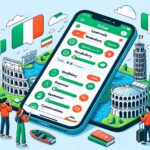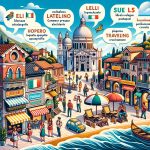Travelling to Italy is a dream for many, with its rich cultural heritage, stunning landscapes, and delicious cuisine. However, when embarking on this exciting adventure, one might wonder: what language should I learn? In this article, we will delve into the language aspect of travelling to Italy and discover the importance of learning the local language.
Language plays a significant role in enhancing the travel experience. It allows us to connect with locals on a deeper level, facilitating authentic cultural interactions that can truly enrich our journey. By learning the language spoken in our destination country, we gain access to a world of possibilities – from having meaningful conversations with locals to navigating through unfamiliar streets and ordering at restaurants without any confusion.
When it comes to Italy, there is no better language to learn than Italian. As the native tongue of this beautiful country, Italian holds its own charm and intrigue. In our exploration of the Italian language, we will dive into its history and origins, uncovering fascinating insights that contribute to understanding Italy’s unique cultural identity.
Learning Italian offers numerous practical benefits when traveling in Italy. From shopping for souvenirs to asking for directions or engaging in basic conversations with locals, speaking even just a few phrases in Italian can make a world of difference. It opens doors to friendlier interactions with Italians and allows us to navigate daily situations more confidently.
In the upcoming sections of this article, we will explore various aspects related to language when travelling in Italy. From immersing oneself in Italian culture through language to understanding regional dialects and suggesting helpful resources for learning Italian before or during your trip, we aim to equip you with valuable knowledge that will enhance your experience in this captivating country.
So let’s embark on this linguistic journey together and discover how the right language skills can open doors to a more fulfilling Italian adventure.
The Importance of Language while Travelling
When traveling to a foreign country, learning the language of that country can greatly enhance the overall travel experience. Although it is possible to navigate through a foreign land with just English or other widely spoken languages, taking the time to learn some key phrases and basic conversational skills in the local language can make a significant difference. Here are some advantages and benefits of learning a language before traveling.
Authentic Cultural Interactions
One of the main advantages of learning the language while travelling is the ability to engage in authentic cultural interactions with locals. By speaking their language, you can show respect for their culture and demonstrate your genuine interest in understanding their way of life.
It opens up doors for meaningful conversations, sharing stories, and making connections with people you may not have been able to communicate with otherwise. This not only enriches your travel experience but also allows you to gain unique insights into the local customs, traditions, and way of thinking.
Enhanced Communication Skills
Learning the local language also greatly enhances your communication skills and makes it easier to navigate through various situations during your trip. With even just basic knowledge of the language, you can confidently order food at restaurants, ask for directions or assistance when needed, bargain at markets, and interact with locals in everyday scenarios. This level of independence opens up opportunities for exploration and enables you to fully immerse yourself in the destination.
Navigating Practical Situations
In addition to enhancing cultural interactions and communication skills, learning the local language also helps in navigating practical situations. Understanding signage, public transportation announcements, menus, and basic information becomes easier when you have a grasp on the language. It saves time and reduces frustration that might arise from constantly relying on translation apps or struggling to communicate effectively in unfamiliar situations.
By understanding these advantages, it becomes clear why learning at least some basics of a foreign language before traveling is highly beneficial. However, when traveling to Italy specifically, there is a language that should be prioritized: Italian. In the next section, we will delve into the Italian language and its significance in the context of traveling to Italy.
Italian
Italy is known for its rich history, breathtaking landscapes, and delicious cuisine. But what truly sets this country apart is its vibrant language – Italian. Embracing the language of Italy can greatly enhance your travel experience and allow you to immerse yourself in the culture like never before.
Italian, a Romance language, is closely related to other languages such as Spanish, French, and Portuguese. It originated from Latin and has evolved over centuries to become the beautiful language it is today. Learning Italian opens doors to better communication with locals, as well as a deep understanding of the country’s history, traditions, and art.
There are numerous practical benefits to learning Italian when traveling in Italy. Firstly, it allows for smoother navigation through cities and towns. From reading street signs to understanding public transportation announcements, knowing the local language makes getting around much easier.
Additionally, being able to order food in Italian at restaurants or ask for directions confidently will make you feel more at ease during your trip. Basic conversations with locals become more meaningful and enjoyable when you can communicate directly in their native tongue.
To fully immerse yourself in Italian culture, learning the language is essential. Language plays a crucial role in understanding cultural nuances that may not be apparent through simple translations or observations. By speaking Italian, you’ll gain deeper insights into the customs, traditions, and ways of life that define different regions across Italy.
Practical Benefits of Learning Italian
Learning Italian before traveling to Italy offers numerous practical benefits that can greatly enhance your travel experience. Here are a few reasons why learning Italian is advantageous:
- Navigation: When exploring a new country, it can be challenging to navigate your way around without knowing the local language. Learning Italian allows you to read signs, understand directions, and ask for help when needed. This can make getting from one place to another much easier and less stressful.
- Ordering at Restaurants: Italy is renowned for its delicious cuisine, and being able to communicate with restaurant staff in their native language can enhance your dining experience. Knowing Italian enables you to understand the menu, make specific requests or modifications, and engage in conversations about food recommendations or local specialties.
- Shopping: Whether you’re shopping for souvenirs, clothing, or groceries in local markets, knowing Italian will give you an advantage. It allows you to negotiate prices more effectively, read labels and descriptions correctly, and ask questions about products you’re interested in. Additionally, speaking some basic Italian phrases with locals during transactions shows respect and may result in better customer service.
To make the process of learning Italian easier and more enjoyable before your trip, here are some tips:
- Start with the basics: Familiarize yourself with common phrases used in everyday situations such as greetings, ordering food, asking for directions, and shopping.
- Use language-learning apps: Utilize popular mobile applications like Duolingo or Rosetta Stone to learn vocabulary and practice pronunciation at your own pace.
- Take online courses: Many websites offer comprehensive online courses designed specifically for travelers looking to learn essential language skills quickly.
- Find a language exchange partner: Connect with native Italian speakers through language exchange websites or apps such as Tandem or HelloTalk. This gives you an opportunity to practice conversational skills while helping others learn your native language.
By taking these steps to learn Italian before your trip, you will feel more confident and prepared to navigate Italy, engage in meaningful interactions with locals, and create lasting memories. Remember, language is a key that can open doors to a more fulfilling Italian adventure.
Immersing in Italian Culture through Language
When visiting a new country, immersing oneself in the local culture is often one of the most rewarding experiences. Language plays a crucial role in understanding and connecting with the culture, and this is particularly true when traveling to Italy. Italian is not only the official language of Italy, but it also reflects the rich history and diverse regional identities within the country.
Language forms an integral part of cultural immersion as it allows travelers to communicate with locals and understand their way of life. Through learning Italian, travelers can engage in meaningful conversations with Italians, gaining insights into their traditions, customs, and values. By speaking their language, visitors can build bridges between themselves and the locals, encouraging more authentic interactions that go beyond the typical tourist experience.
Furthermore, learning Italian opens doors to understanding cultural nuances that may otherwise go unnoticed. Like any language, Italian has its idioms, expressions, and gestures that cannot be solely grasped through translations or textbooks.
By becoming familiar with these linguistic nuances during language learning, travelers enhance their ability to comprehend subtle social cues during conversations and interactions. This deeper level of understanding enables them to fully appreciate Italia’s rich cultural tapestry and truly immerse themselves in the local way of life.
Regional Dialects
When traveling to Italy, it is essential to be aware of the diverse regional dialects that exist in the country. Just like many other nations with a rich cultural history, Italy has a multitude of regional languages and dialects that vary significantly from one region to another. Understanding these dialects can greatly enhance your travel experience by allowing you to better communicate with locals and gaining insight into their unique culture and traditions.
The Existence and Importance of Regional Dialects
Italy is composed of 20 regions, each with its own distinct identity and language variations. These regional dialects stem from historical, geographical, and even political factors. As travelers venture from one region to another, they may encounter different linguistic expressions, vocabulary, grammar structures, pronunciation, and even gestures. It is important to note that while Italian is the official language of Italy, many Italians still speak their specific regional dialect as their first language.
Understanding these regional dialects can open doors for more meaningful interactions with locals. When you make an effort to communicate using their own language or learn common phrases in a particular dialect, Italians will appreciate your respect for their culture and are more likely to be receptive towards you. Moreover, being familiar with these dialects will allow you to better comprehend local customs and traditions which can greatly enrich your understanding and appreciation of the areas you visit.
Focusing on Region-Specific Dialects
While it may not be practical or necessary to become fluent in every regional dialect before traveling to Italy, it is beneficial to focus on learning some basic phrases or peculiarities that are specific to the regions you plan on visiting. For example, if you’re heading to Sicily or Southern Italy where they speak Sicilian or Neapolitan respectively, picking up some key words and phrases in these dialects will help you navigate conversations more effectively.
It’s worth noting that while regional dialects differ, the Italian language remains the lingua franca and is widely understood across the country. Therefore, having a good grasp of Italian will still be useful in most situations. However, expressing an interest and demonstrating some knowledge of regional dialects can create a stronger connection with locals and show them that you appreciate their cultural heritage.
By familiarizing yourself with the regional dialects of Italy, you can embark on a truly immersive journey into its diverse linguistic landscape. Not only will this understanding facilitate better communication and cultural interaction, but it will also deepen your appreciation for the rich tapestry of languages that exist within the country. Whether learning key phrases or delving into more comprehensive language studies, embracing the regional dialects of Italy will undoubtedly enhance your overall travel experience.
Language Learning Tips and Resources
Learning a new language can be an exciting and challenging endeavor, especially when it comes to preparing for a trip to Italy. Luckily, there are numerous language learning tips and resources available to help you quickly pick up the essentials of Italian or brush up on your skills before your trip.
One of the most effective ways to learn a language is through immersion. Immerse yourself in the Italian language as much as possible by listening to Italian music, watching Italian movies or TV shows, and reading books or articles in Italian. This will help familiarize yourself with the pronunciation, vocabulary, and grammar of the language.
Another useful tip is to practice speaking Italian with native speakers. Language exchange websites such as iTalki or Tandem allow you to connect with language partners who are looking to learn your native language while helping you improve your skills in Italian. This not only provides an opportunity for conversation practice but also allows you to make connections with locals before even stepping foot in Italy.
To supplement your learning, consider using online language courses or mobile apps designed specifically for learning Italian. Duolingo and Babbel are popular options that offer interactive lessons and exercises that cover various aspects of the Italian language, including vocabulary, grammar, and pronunciation.
Lastly, if you prefer a more structured approach to learning, consider enrolling in a language course or attending an immersive language school once you arrive in Italy. Many cities offer short-term courses tailored for tourists that provide intensive instruction in conversational Italian. These courses often include cultural activities and excursions, giving you the opportunity to practice what you’ve learned outside of the classroom.
By utilizing these language learning tips and resources before and during your trip to Italy, you’ll be able to enhance your travel experience by connecting more deeply with locals, navigating through different regions more easily, and immersing yourself more fully in the rich culture of Italy.
| Language Learning Tips | Language Learning Resources |
|---|---|
| Immerse yourself in the language by listening to music, watching movies or TV shows, and reading books or articles in Italian. | iTalki |
| Practice speaking with native speakers through language exchange websites such as Tandem. | Duolingo |
| Use online language courses or mobile apps like Duolingo and Babbel to supplement your learning. | Babbel |
| Consider enrolling in a language course or attending an immersive language school once you arrive in Italy. | Intensive Italian Courses in Italy |
Utilizing Language Learning Opportunities in Italy
Italy offers a plethora of language learning opportunities for travelers who want to enhance their experience by immersing themselves in the local culture and mastering the Italian language. Whether you are a beginner looking to grasp the basics or an intermediate learner aiming to become more fluent, Italy provides a range of options to suit your needs.
One of the most popular ways to learn Italian in Italy is by enrolling in a language course. Language schools can be found throughout the country, offering intensive courses that cater to different proficiency levels. These courses typically involve both grammar lessons and practical exercises to improve speaking and listening skills. It’s a great way to interact with fellow language learners from around the world and receive guidance from experienced instructors who can provide valuable insights into Italian culture.
For those seeking an immersive language learning experience, there are also programs available that combine language study with cultural activities. These programs often include homestays with local families, where you have the opportunity to practice your Italian skills in everyday situations. Additionally, some programs offer excursions and field trips to historical sites and landmarks, allowing you to further explore the rich history and heritage that Italy has to offer.
Another option for language learners is participating in language exchange programs. These programs connect travelers with native speakers who are looking to learn or improve their English skills. Through conversation exchanges, you can practice speaking Italian while helping others practice English. This not only allows you to enhance your language skills but also provides an opportunity for cultural exchange and making new friends.
| Language Learning Opportunities in Italy | Details |
|---|---|
| Language Courses | Intensive courses catering to different proficiency levels, providing grammar lessons and practical exercises. |
| Immersive Language Programs | Courses that combine language study with cultural activities, including homestays and excursions to historical sites. |
| Language Exchange Programs | Connects travelers with native speakers for conversation exchanges, allowing practice in speaking Italian. |
Conclusion
In conclusion, learning the Italian language before traveling to Italy can greatly enhance your overall travel experience. Not only does it help with practical aspects such as navigation, ordering at restaurants, and shopping, but it also allows for more meaningful cultural interactions. By immersing yourself in the Italian language, you can better understand and communicate the nuances of Italian culture.
One practical benefit of learning Italian is that it facilitates basic conversations with locals. Being able to converse in their native language shows respect and appreciation for the culture, opening doors to authentic interactions and experiences. Additionally, learning regional dialects can be invaluable depending on your destination within Italy, as these dialects are an important part of local identity and heritage.
Fortunately, there are plenty of resources available to aid in language learning. Language apps, online courses, and language exchange websites are all valuable tools that can help you quickly learn the basics of Italian before your trip. Once in Italy, consider taking advantage of language learning opportunities such as language courses or immersive language schools. These experiences will not only improve your language skills but also provide unique cultural insights and connections.
Frequently Asked Questions
What Italian should I learn before going to Italy?
Before going to Italy, it is highly recommended to learn some basic Italian. While many Italians in popular tourist areas may speak English, particularly younger people or those working in the tourism industry, it is still beneficial to have some knowledge of the local language.
Learning common phrases and greetings such as “hello,” “thank you,” and “excuse me” can go a long way in making connections and showing respect to the locals. It will also make your travel experience more enjoyable as you navigate transportation, order food, or seek directions.
Can I go to Italy if I only speak English?
It is possible to visit Italy with just English as a means of communication, especially in major cities and popular tourist destinations. The country attracts millions of tourists each year, and many Italians working in the tourism sector are proficient in English. In larger cities like Rome, Florence, or Milan, you will likely find that English can get you by quite well while visiting attractions or interacting with service providers.
However, it’s important to keep in mind that outside these areas, particularly in smaller towns or rural regions, English proficiency might be limited among locals. In such cases, having some basic knowledge of Italian phrases would significantly enhance your travel experience.
Can I travel to Italy if I don’t speak Italian?
Yes, you can definitely travel to Italy even if you don’t speak Italian. As mentioned earlier, many Italians working in the tourism industry have a good grasp of English and will be able to assist you in major cities or tourist spots. In addition to this, most tourist attractions also provide information and guided tours in multiple languages including English.
However, traveling without speaking the local language might limit your ability to communicate with locals directly or fully engage with the local culture beyond surface-level interactions. It’s always advisable to learn a few key phrases before your trip so that you can express yourself when needed and show appreciation for Italian culture and customs along the way

I’m a passionate traveler, writer, and Italophile. My fascination with Italy’s history, art, and culture has led me on countless adventures across the Italian landscape. Through “I Live Italy,” I share my love for this extraordinary country and aims to inspire others to explore its boundless beauty.





